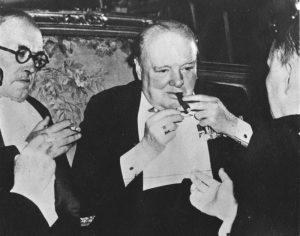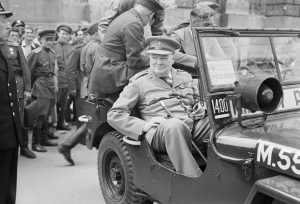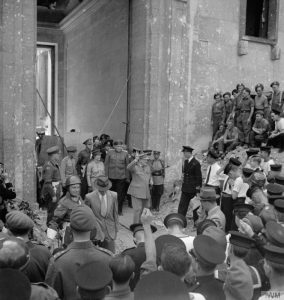
Finest Hour 162
Munich Timeline

Winston Churchill, Parliament Square, London © Sue Lowry & Magellan PR
February 14, 2015
Finest Hour 162, Spring 2014
Page 28
Compiled by Michael McMenamin and the Editor
1938
18 March: Soviet Union proposes conference with Britain and France on implementing the Franco-Soviet pact in event of German aggression.
20 March: Chamberlain: “I have abandoned any idea of giving guarantees to Czechoslovakia, or to the French.”

2025 International Churchill Conference
28 March: Hitler tells Sudeten Nazi Henlein to make “unacceptable demands” on the Czech government.
21 May: Czech army on alert. Britain and France warn Hitler, who is perceived to have backed down.
28 May: Hitler, furious at perceptions that he yielded, declares, “Czechoslovakia shall be wiped off the map.”
3 June: General von Beck writes Hitler opposing invasion of Czechoslovakia on military grounds.
15 June: German General Staff war game concludes Czech invasion will take three months while France is advancing deep into German territory.
18 June: Hitler says he won’t march unless convinced that France and England will not intervene.
16 July: Von Beck again writes Hitler, stating that an attack on the Czechs will involve war with Anglo-French.
18 July: Halifax tells Hitler’s adjutant that Britain will resist German aggression.
4 August: At secret meeting of generals, von Beck reads his 16 July memo to Hitler. Beck and Halder conclude “something must be done” to prevent disaster.
17 August: Ewald von Kleist goes to London. Von Beck tells Kleist: “Bring me certain proof that England will fight if Czechoslovakia is attacked and I will make an end of this regime.”
18 August: Kleist delivers his message to Vansittart who reports it to Halifax, and Halifax to Chamberlain.
19 August: Kleist delivers his message to Churchill, who writes for the record that a German invasion would result in “a renewal of the world war.”
20 August: Chamberlain compares von Kleist to “the Jacobites at the Court of France in King William’s time.”
21 August: Hitler forces von Beck’s resignation: “The only man I fear is Beck. That man would be capable of acting against me.”
4 September: Franz Halder, von Beck’s successor, meets with Reichsbank President Schacht, who agrees to head a provisional government following a coup.
5 September: Halder meets with Gisevius to discuss police support of coup, calls Hitler a “madman” and “criminal,” wishes Hitler to meet with a “fatal accident.”
7 September: Theo Kordt at the German Embassy, London, informs Halifax that German army will depose Hitler if the Führer orders an invasion of Czechoslovakia.
12 September: Hitler demands “the right of self-determination” for Sudeten Germans, calls Czechoslovakia a “fraudulent state.”
13 September: Nazis foment violence and disruption in Czechoslovakia. Halder wants coup “in the brief breathing spell” before “the first exchange of shots.”
14 September: Chamberlain to George VI: Britain and Germany are “the two pillars of European peace and buttresses against communism.” The Prime Minister discloses his “Plan Z” to Cabinet. Hitler is “flabbergasted” by Chamberlain’s offer to fly to Germany.
15 September: Chamberlain flies to meet Hitler at Berchtesgaden.
16 September: French Premier Daladier meets with British Foreign Minister Lord Halifax in London.
18 September: Mussolini declares he supports Hitler.
20 September: Plotters finalize plans for raiding party to arrest Hitler. Oster and Heinz privately agree that Hitler must be killed in the confusion.
21 September: Czech President Beneš agrees to Sudetenland plebiscite and to cede majority German territory in exchange for an Anglo-French “guarantee.”
22-23 September: At Bad Godesberg, Hitler reneges on plebiscite pledge, demanding Czech withdrawal and occupation of Sudetenland.
23 September: Czechoslovakia mobilizes. British chiefs of staff express “confidence as to the ultimate outcome.”
24 September: Hitler’s Godesberg Memorandum demands Czechs accept Sudetenland ultimatum by 2pm on 28 September. Later he sets occupation date back to 1 October “out of respect” for Chamberlain.
25 September: To Chamberlain’s shock, Halifax tells the Cabinet: “Hitler has given us nothing…as if he had won a war without having to fight.”
26 September: German generals refused audience with the Führer. Horace Wilson conveys Chamberlain’s letter to Hitler stating that if Czechs reject terms and France is involved, Britain will support France.
27 September: Coup raiding party assembles at safe houses. Royal Navy ordered to mobilize. Hitler postpones German mobilization twenty-four hours, telling Goering, “the English fleet might shoot after all.”
28 September: Raiding party issued arms and ammunition. Chamberlain proposes conference by which Hitler will get “all essentials without war and without delay.”
29 September: Munich Accord—virtually identical to Godesberg Memorandum—signed by Hitler, Mussolini, Chamberlain and Daladier, excluding the Czechs.
30 September: Czechoslovakia capitulates. Returning to Britain, Chamberlain declares “peace for our time.”
2 October: Inspecting Czech fortifications, Hitler tells Goebbels, “we would have shed a lot of blood.”
3 October: Duff Cooper resigns as First Lord of the Admiralty. Oster, Schacht, Gisevius and Witzleben burn their conspiracy papers.
5 October: Beneš resigns as Czech President. In London, Churchill tells Parliament: “we have sustained a total and unmitigated defeat…”
6 October: British Ambassador to Germany Nevile Henderson writes Lord Halifax, “by keeping the peace, we have saved Hitler and his regime.”
10 October: German troops begin occupying Sudetenland. Czechoslovakia loses 70% of its iron, steel and electrical power and 3.5 million citizens.
18 October: Churchill broadcasts to America on his view of Munich.
1939
8 January: French generals tell Churchill they were “confident they could have broken through the weak, unfinished German line…by the fifteenth day.”
14 March: Slovakia secedes from Czechoslovakia to form an independent, pro-Nazi state. Ruthenia secedes but is occupied by Hungary.
15 March: Germany occupies remainder of Czechoslovakia, proclaims Protectorate of Bohemia and Moravia, which will supply 25% of German weaponry.
Subscribe
WANT MORE?
Get the Churchill Bulletin delivered to your inbox once a month.





